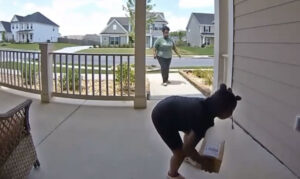Four defendants convicted in Fayette County are seeking a new trial, claiming the affair between former Fayette County public defender Kimberly Cornwell and former Superior Court Judge Paschal A. English Jr. adversely affected their rights to fair trials.
Defense attorneys contend that Cornwell should have disclosed her relationship with English to the three defendants whom she represented in trials with English as the presiding judge. The fourth defendant is appealing because Cornwell represented a codefendant in his case before Judge English.
In a court hearing April 20, two public defender attorneys and state prosecutors stipulated to the facts surrounding the October 2008 incident in which a sheriff’s deputy investigating a suspicious vehicle in a failed subdivision discovered Cornwell and English engaged in sexual intercourse.
The decision on whether to grant the new trial motions rests with Fayette County Superior Court Judge Fletcher Sams, who by all accounts is in a tough spot. If he orders new trials, the victims in all four cases will have to relive their cases, and they almost certainly would be required to testify again.
In one of the cases, that means a girl will have to testify again about how a relative raped her days after he got out of prison, said Assistant District Attorney David Younker. The defendant, William Jacob Nutt, was convicted of aggravated child molestation and aggravated sexual battery, but not guilty of rape, and English sentenced him to life in prison March 24, 2010.
Likewise, prosecutors expect it to be traumatic for a carjacking victim to relive the tale of how he was kidnapped at gunpoint from a convenience store in downtown Fayetteville and forced into the trunk of a car, Younker said. The defendant Cornwell represented in that case, Travion Marquez Willis, was convicted of armed robbery, kidnapping, aggravated assault, possession of a firearm during the commission of a crime and motor vehicle theft. Also convicted of the exact same charges in that case was Willis’ codefendant Christopher Deangelo Wakefield, who was represented at trial by attorney Vernon Smith.
English sentenced Wakefield to life in prison plus 20 years and Willis to life in prison Nov. 14, 2008.
The fourth defendant seeking a new trial on the basis of the Cornwell-English affair is Calvin Obie Boynton, who was found guilty Sept. 15, 2009 of armed robbery, aggravated assault, possession of a sawed-off shotgun and another weapons charge, all stemming from the May 2009 robbery of the United Community Bank off Wisdom Road in Peachtree City.
English sentenced Boynton to life plus 30 years in prison.
At last Wednesday’s motions hearing, assistant district attorneys David Younker and Jeremy Hayes argued that there was nothing in the transcript of either trial to indicate there was judicial bias against any defendants.
Judge Sams later remarked that judicial bias can appear in ways that aren’t communicated in the transcript, such as the jurist’s facial reactions to the presentation of certain evidence, for example.
Sams recalled as a young lawyer when he started to “score points” in a particular trial, the judge would activate his loud pencil sharpener, and the net affect was to stall his momentum, while also potentially distracting the jury.
Younker also argued that it was the jury in each of the four cases that convicted the defendants, not Judge English.
Before Sams will rule in the case, the defendants will have to testify as to what they did or did not know about the relationship between Cornwell and English prior to their trials. The defendants were not in court for the motions hearing last Wednesday despite orders that were sent for them to be brought from their respective state prison facilities.
Also at last week’s hearing, the court heard testimony that Judge English in 2009 attended a public defenders conference in Reno, Nev., with Cornwell.
Defense attorney Steve Phillips had hoped to elicit testimony from Cornwell, but through her attorney she asserted her right against self-incrimination offered by the Fifth Amendment to the U.S. Constitution.
According to the Georgia Bar’s online directory of attorneys, Cornwell is currently practicing with the law office of Bruce S. Harvey, and she is listed as an “active member in good standing” with no public disciplinary history on record.
Likewise, the Georgia Bar’s website still lists English as “an “active member in good standing” with no public disciplinary history on record, though it also lists him as still being a judge for the Griffin Judicial Circuit.
English resigned in April 2010 as he faced an investigation into the affair by the Georgia Judicial Qualifications Commission. Cornwell months later also resigned from her position at the Fayette County Public Defender’s Office after she was initially placed on paid administrative leave.











Leave a Comment
You must be logged in to post a comment.